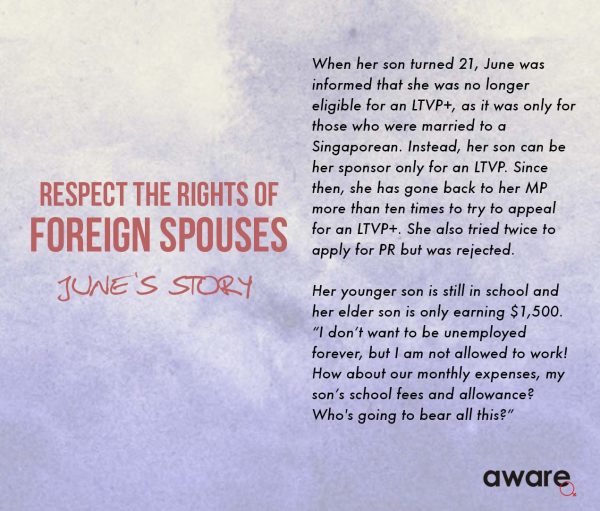-
Advocacy Theme
-
Tags
- Abortion
- Adoption
- Caregiving
- CEDAW
- Disability
- Domestic Violence
- Domestic Workers
- Harassment
- Healthcare
- Housing
- International/Regional Work
- Maintenance
- Media
- Migrant Spouses
- Migrant Workers
- Muslim Law
- National budget
- Parental Leave
- Parenthood
- Polygamy
- Population
- Race and religion
- Sexual Violence
- Sexuality Education
- Single Parents
- Social Support
- Sterilisation
- Women's Charter
Respect the rights of foreign spouses: June’s story
April 20th, 2018 | Children and Young People, Employment and Labour Rights, Family and Divorce, Migration and Trafficking, News, Poverty and Inequality, Your Stories

June* is a 49 year-old Filipina and has been living and working in Singapore for 25 years. She was married to a Singaporean man and have two children together. They got divorced in 2008 and June gained custody and sole care and control of the children, who were 13 and 10 years old. After the divorce was finalised, June was informed that she would need to have a Singaporean sponsor for her Long-Term Visit Pass as her children, although Singaporeans themselves, were underage and would not be able to be the sponsor. ICA said she was a “special case” as she was a single mother to underage children and allowed non-family members to sponsor her LTVP until one of her children turns 21 years old. Year after year, June sought help from her Singaporean friends to renew her LTVP so she could continue to work and stay in Singapore with her children. It was a troublesome process as there was no guarantee that she would always be able to find someone to renew her pass.
Access to housing was also an issue for June as a single mother who was also a foreigner. After the divorce, June and her children rented from the private market, spending $700-$800 on monthly rent. In 2015, the landlord decided to sell the house and June and her children suddenly found themselves homeless. They lived with June’s friend for two months but it was not a sustainable arrangement as there was a total of 9 persons living in the 2-room HDB unit. At that point, June was also out of a job. Feeling desperate, she and her children sought help from social service organisations and MCYS, who brought her to HDB to appeal for an HDB rental unit. They have since been living in a rental unit.
In the same year, June also sought help from her MP to get an LTVP+, which would make it easier for her to seek work here*. The MP appeal was successful and June got an LTVP+.
However, when her son turned 21 years old, June was informed that she was no longer eligible for an LTVP+, as it was only for those who were married to a Singaporean. Instead, her son can be her sponsor only for an LTVP. Since then, she has gone back to her MP more than ten times to try to appeal for an LTVP+. She also tried twice to apply for Permanent Residence but was rejected.
Since being back on LTVP, June has been having a very tough time looking for work. When her prospective employers tried to apply for a Work Permit for June, the applications was rejected due to her country of origin (it is likely due to the foreign worker quota). June tried to make an appeal at the Ministry of Manpower and was told that she could try getting her employer to apply for an S-Pass instead. However, the salary amount that employers were willing to pay her were too low given her work experience, and MOM rejected the applications.
June hopes very much to be able to continue working in order to support her family. Her younger son is still schooling and her elder son is only earning $1,500. They are struggling with rent and daily expenses.
“I don’t want to be unemployed forever, but I am not allowed to work! How about our monthly expenses, my son’s school fees and allowance? Who’s going to bear all this? I don’t think that my eldest son can shoulder it all.”
* Prospective employers of those on LTVP+ will apply to the Ministry of Manpower (MOM) for a Letter of Consent (LOC), instead of an Employment/S Pass or Work Permit, for them. LTVP+ holders who are issued with LOCs will not be counted against the foreign worker quota of their employers. Their employers are also not required to pay foreign workers’ levy for them.



